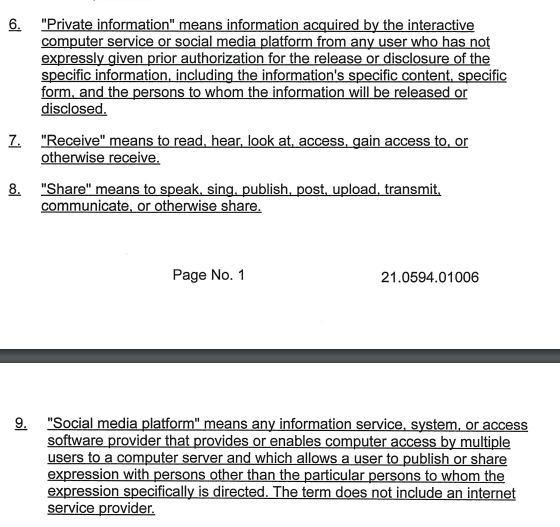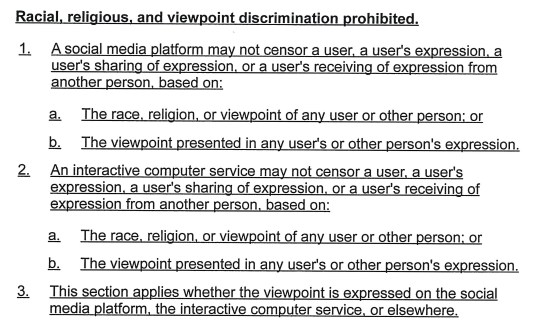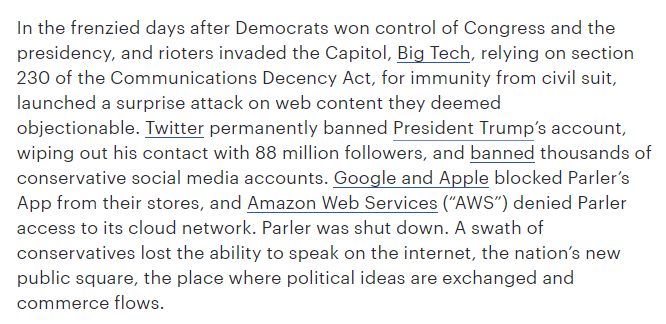
1/ As sure as I'm a cranky bastard, state reps will keep introducing asinine bills that violate the First Amendment, are preempted by #Section230, & reveal their authors' cluelessness. This one courtesy of @ARStateRep43 & @VoteRickyHill of @ARGOP: arkleg.state.ar.us/Bills/Detail?i…\...\You
2/ can tell that we're off to a stupid start right from the subtitle. I usually don't go into the legislative findings because state legislators have a hard time finding their way out of their own asses, but I can't help myself on this one.
3/ Can someone tell me what on God's green earth this even *means*? I don't even think the people who use "cancel culture" unironically would look at this sentence and say "mhm, yep, makes sense to me." 

4/ Well, existing federal law doesn't protect me from Arkansans' autonomous power to elect idiots who are unaware of the First Amendment's existence to their legislatures, but that doesn't mean a law taking away their state sovereignty would be constitutional either. 

5/ Listen, I know you guys are in the bottom quartile nationally for education, but lazy and stupid is no way to go through life. You don't have a First Amendment right against private people or companies, nor is it censorship when they tell you that you can't use their property. 

6/ Anyway, on to the actual bill. It's actually fairly simple. Basically what the bill does is try to make it unlawful for a website to remove content, ban users, etc... specifically under Section 230(c)(2)(A) if it is not done in "good faith," and tries to define good faith. 



7/ "Seems reasonable," you might say! "Section 230 doesn't define good faith so maybe this isn't inconsistent and therefore not preempted," you continue.
There's just one problem: this bill--and its authors--fundamentally misapprehend how #Section230 actually operates.
There's just one problem: this bill--and its authors--fundamentally misapprehend how #Section230 actually operates.

8/ You see, a gigantic majority of content moderation cases have nothing to do with § 230(c)(2)(A). Instead, content moderation is typically analyzed under § 230(c)(1), which immunizes sites from publisher liability, which includes "traditional editorial functions"
9/ Such functions include deciding what to publish or not publish, and what to take down, and even who to ban. § 230(c)(2)(A) generally only comes into play when the site was responsible at least in part for the content's creation. But that's not what these people are after.
10/ So best case scenario for our hapless legislative numbskulls is that this bill does a whole lot of absolutely nothing even if it does survive judicial scrutiny, because it only applies in cases where (c)(2)(A) is invoked.
Nice.
Gold star for Ricky and Brian.
Nice.
Gold star for Ricky and Brian.
11/ And I don't think this bill survives preemption in any event. The clear purpose of the bill is to impose some kind of viewpoint neutrality on websites, which is fundamentally incompatible with #Section230, written to *enable* content moderation, and is therefore inconsistent.
12/ Which leads us to the next problem: these Arkansassholes are not only ignorant of how § 230 works, but also how the First Amendment works. This bill would seek to force websites to carry user content against its wishes.
13/ This kind of compelled publication is forbidden by the First Amendment, and it doesn't matter if the bill shoves it into the category of "Unfair and Deceptive Trade Practices" or whatever else they may want to call it (and that doesn't get it around § 230(c)(1) either).
14/ It's hardly surprising that state legislators are seizing the opportunity to showboat on the hot grievance politics of the day, but is it too much to ask for them to know more than a HS student about the subjects they are attempting to legislate?
15/ JK. Of course it's too much to ask.
• • •
Missing some Tweet in this thread? You can try to
force a refresh







